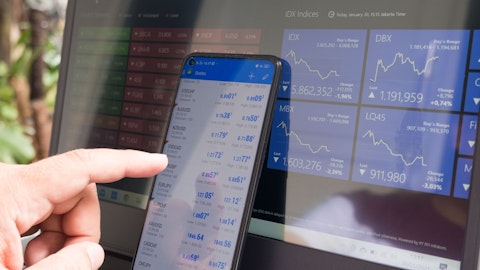Some customers take a, I’ll do it on a microservices basis, where I’ll start peeling off functionality of the existing application and move that functionality to the new application and do that over time. It really depends on the customer’s use case and their business needs. And yes, with GenAI, we do expect that rewriting the application has become easier and hence lower the cost of essentially switching, which by definition then expands the amount of customers and workloads you can go after. The other, I would say, on top of the three reasons I gave you in terms of why people move, there’s now an emerging fourth reason, which is enabling their data and their applications to be more AI enabled. And so it’s not just moving to more modern platform, but making them more AI enabled.
And so that’s also something that’s getting customers’ interest. And to your question on timing, as I said, I think this year we’re going to see a lot of pilots and people trying out these new AI capabilities. And I think as the technology improves, as we learn more, I think you’re going to see that scale much more quickly after that.
Rishi Jaluria: Wonderful. Really helpful. And then, Michael, just quickly, you put up your first free cash flow positive year in public company history. Just as we think about the margin guidance for next year, how should we be thinking about cash conversion going forward? Thanks.
Michael Gordon: Yeah, so I think the two factors to think about in terms of cash conversion are, within Atlas, there’s this dynamic where we are reducing and continuing to see less upfront Atlas. Obviously, we’re hitting the anniversary of that, and that’s what’s creating the headwind on the revenue front and the tough compare. But that’s with Atlas at 68% of revenue. And so if you assume that Atlas is going to increase as a percent of revenue, I think that will sort of further drive the divergence. And then the only other big delta is things related to SBC and stuff like that. But I think it’s the Atlas dynamic when you think about potential changes from a cash conversion standpoint, I think is where I’d focus and the impact, if you assume that Atlas is going to be a larger percent of the business.
Rishi Jaluria: All right, very helpful. Thank you, guys.
Operator: Thank you. [Technical Difficulty] comes from the line of Tyler Radke of Citi. Your line is open.
Tyler Radke: Hey, can you hear me okay?
Dev Ittycheria: Yeah. Hey, Tyler. Good evening.
Tyler Radke: Okay. Cool. Okay, sorry, the line was a little choppy. Dev, I wanted to ask you just a question as it relates to competition. Obviously, it’s been a busy week at both Snowflake and Databricks with Frank Slootman retiring. I hope you’re not going anywhere soon. But Databricks announcing pretty impressive growth. I guess, how do you think about your positioning relative to those two vendors, especially with the new CEO, kind of more of a technical focus at Snowflake, and new store product coming out later this year, do you expect to compete more, just frame for us how you’re thinking about it, especially as the GenAI momentum increases over the coming years?
Dev Ittycheria: Yeah, so first of all, I’m very committed to MongoDB. I’m very excited about the opportunity here, so I have no plans to go anywhere. Second, in regards to Snowflake and Databricks, we don’t typically compete with them, right? Because they’re focused on analytical workloads. We’re focused on operational workloads. So those are two very different sets of use cases. The big difference in terms of how customer buy, typically data warehouses and data lakes tends to be a centralized decision, organizations standardize on one platform, and then basically move their existing data to those platforms where I would say, operational platforms tend to be a more decentralized decision where different development teams, different lines of businesses, et cetera, based on the requirements for their application, will choose, will make their own independent decisions about what they think they need to do.
And we’ve always talked about how we start with one team and then try and expand from there, and why there’s so much focus on expanding within accounts and becoming a standard within an account, because then that accelerates the amount of workloads we capture. But those are two very different kind of customer buying behaviors in terms of analytical versus operational. With regards to the potential overlap, we are embedding more analytics capabilities. We have a very sophisticated aggregation framework, so people can do real-time processing of analytics on our platform with real-time data. Remember, data lakes and data warehouses have a batch process to get that data into their platforms, so they’re not dealing with the real-time data. And then with regards to Unistore, listen, there’s like over 300 databases in the marketplace, so not sure, I have a lot of respect for the Snowflake people.
I’m not sure, we’ve heard noises about Unistore for a long time, but we feel very comfortable and confident about our position just given the investments we made on our platform and the large customers we have. And frankly, the popularity of our platform with developers. And remember, developers are not a persona that these other players typically go after. They go after more the analysts and the data scientist community. We’re very, very focused on developers.
Tyler Radke: That’s helpful. Michael, just a quick follow-up for you on the overage comments you made. I guess a couple questions. First of all, the $40 million is what I think you called out. That seems pretty high for last year, just considering we hadn’t really heard about it, since Q4 of last year, we called out only several million of overage credit figures. Can you just frame for us, was that consistent with what you’ve seen in prior years? And I guess, you’re obviously embedding that that doesn’t continue next year. Is that a change in the way that you’re recognizing overage revenue or is that just — you don’t expect that to happen because all your contracts have been reset? Thank you.





